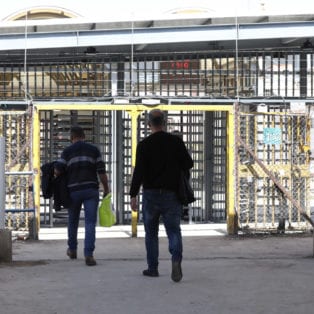
Apr 23, 2020
Nearly 50,000 workers have left Palestinian territories to work in Israel in recent days, after Palestine and Israel struck an agreement to allow them to work and stay in Israel for up to two months. This measure was taken to control the spread of the novel coronavirus, exacerbated by the mass movement of workers through crowded checkpoints every day. The agreement applies to workers with special work permits in industries such as construction and agriculture.
Many Palestinian workers say they face the difficult choice of remaining safe at home without income or risking exposure to the virus by journeying to Israel. Prior to the pandemic, up to 150,000 workers traveled to Israel for jobs.
The move follows the return last month of hundreds of thousands of Palestinian workers from Israel, many of whom say they faced poor working and living conditions as COVID-19 spread. Workers in construction, for instance, reported staying overnight at the sites where they worked. The government does not monitor onsite housing conditions or workplace safety for thousands of Palestinian workers deemed essential.
As workers returned to Palestine last month, the Palestinian authority urged them to quarantine and test for COVID-19.
Palestinian health officials have been concerned about possible COVID-19 infections as workers returned to the territories after losing work permits or being forced to quit their jobs by Israeli employers. The Palestinian Ministry of Health says around one-third of COVID-19 infections in Palestine stem from workers who were infected by the virus in Israel and returned home. Many were traced from a chicken factory near Jerusalem.
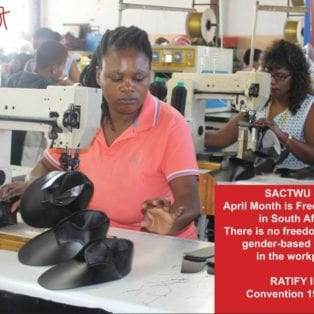
Apr 21, 2020
In Tunisia, 150 women garment workers self-quarantined in their factory to manufacture desperately needed protective masks, churning out 50,000 a day as the COVID-19 crisis broke out. The South African Clothing and Textile Workers’ Union (SACTWU) reached an agreement with employers to guarantee six weeks full pay for 80,000 workers, nearly all women, as operations shut down. And, undeterred by the limitations of social isolation policies, Honduran women union activists are using social media to demand their government ratify a global treaty (Convention 190) ending gender-based violence and harassment (GBVH).
Around the world, women and their unions are leading the way, recognizing that gendered economic challenges are worsened by the pandemic, which is hitting women and other marginalized groups especially hard. They are spearheading calls for safety and health protection and raising awareness about C190, which provides remedies and tools for governments and employers to address the increase in GBVH at work and home.
C190, which the International Labor Organization approved last year, requires employers and governments to take steps to address and prevent GBVH at home, both when it is a place of work and when domestic violence impacts workers’ workplace performance.
Challenging the View that Domestic Violence is a ‘Private Matter’
One of the most dramatic examples of how the COVID-19 pandemic has exacerbated gender inequalities is the significant increase in domestic violence against women.
In El Salvador, domestic violence has increased by 70 percent. Anti-domestic violence service providers from Lesotho to Brazil are reporting increases in calls from women experiencing abuse seeking assistance, according to Solidarity Center staff. Isolated in their homes—or the homes of their employer if they are domestic workers without access to private spaces—many women cannot even reach out for assistance or otherwise seek help to end the abuse.
COVID-19 also has engendered a brutal twist: Exposure to the coronavirus is being used as a threat to further control partners and family members, who in some cases are being forbidden from leaving the house or even are thrown out with nowhere to go. The International Trade Union Confederation (ITUC) and global unions such as UNI and IndustriAll offer resources and guidance about measures unions can take to address the increase in domestic violence resulting from COVID-19 lockdowns.
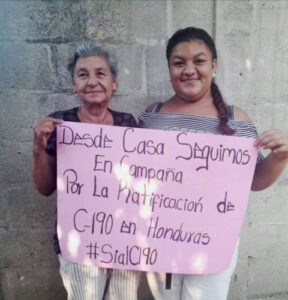
In Honduras, union activists are posting photos of themselves on social media with signs urging passage of C190. Credit: Promotoras LegalesUnions have long recognized domestic violence as a critical issue impacting a workers’ ability to obtain and maintain employment. Research shows that when workers are affected by domestic violence, it often affects their participation in work, their productivity and achievement of work tasks and targets. Employers often inadvertently blame and even terminate the target of domestic abuse in response to the disruptions caused by the abuser.
A Canadian Labor Congress (CLC) survey of more than 8,000 union members that found 67 percent had experienced domestic violence. Of those, 47 percent say they were prevented from going to work by their abuser and 8 percent lost their jobs because of ramifications from their abuse. Surveys by the ITUC in four countries found similar results. For instance, 75 percent of respondents in the Philippines reported that domestic violence affected their work performance because they were unwell, distracted or injured as a result. One in three respondents (34 percent) who had experienced domestic violence reported that their abuser was employed in the same workplace.
C190 prohibits violence and harassment, including GBVH in the “world of work,” which includes private and public places where work is performed, specifically recognizing that many workers work in their own homes or provide care or other services in others’ homes. C190 places responsibilities on ratifying governments, and in turn duties on employers, to mitigate the effects of domestic violence on workers’ ability to access and maintain employment.
In France, the General Confederation of Worker (CGT) is pushing the government to take action around the increase in domestic violence during the COVID-19 confinement by prohibiting dismissal of all targets of domestic violence and requiring employers to negotiate measures to prevent and protect targets of violence, including domestic violence.
Unions Address Effects of Domestic Violence on Workers
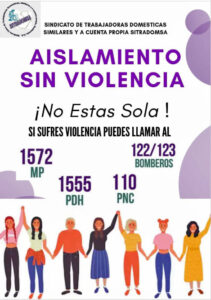 During the COVID-19 crisis, unions around the world are addressing the effects of domestic violence on workers.
During the COVID-19 crisis, unions around the world are addressing the effects of domestic violence on workers.
“Isolation without violence!” reads a graphic (at left) that the Guatemala domestic workers union, Sitradomsa, posted on its Facebook page, with contact information for those experiencing abuse.
In South Africa, where police have received more than 87,000 reports of domestic violence in the first week of mandated social isolation, the Federation of Unions of South Africa (FEDUSA) is appealing to the government to increase the number of mobile clinics, both for COVID-19 testing and for treating targets of gender-based violence with a special focus on vulnerable areas, such as densely populated townships and informal settlements. “The mobile clinics should include staff or other health workers specially trained in handling and managing gender-based violence, including providing psychological support for the victims,” the federation says in a statement.
In Georgia, after an employer forced workers to sleep at a grocery store overnight because of the country’s 9 p.m. to 6 a.m. curfew, the Georgia Trade Union Confederation (GTUC) took action to ensure the workers, mostly women, could safely return home. The union successfully urged the government to require employers to provide workers free transport from work, an element taken from C190, which encompasses a broad definition of violence at work that includes the time workers spending getting to and from work.
Women’s groups in Lesotho and unions representing garment workers, nearly all of them women, are working with employers and the government to address the effects of domestic violence on workers during the lockdown as they continue to fight for wage replacements.
The global campaign for C190 ratification also continues, as the crisis brings in stark relief the connection between violence at home and work. “From home, we are still campaigning for the ratification of C190,” read signs dozens of union members and their families in Honduras are posting on Facebook from their homes.
In Nigeria, women leaders in the Nigerian Labor Congress are highlighting how C190 addresses the increased violence and harassment experienced by nurses, the majority of whom are women, and workers who are now forced to stay home in abusive homes. In South Africa, the Congress of South African Trade Unions (COSATU) and SACTUW are championing government ratification of C190 through Facebook and other online platforms.
“Protecting workers from domestic violence is a core part of an employers’ safety and health responsibilities and the ‘duty of care’ for their employees,” according to the Domestic Violence@Work Network. “It is also an opportunity to think beyond the immediate crisis so that social partners, including governments, employers, unions and service providers, are part of transformative change.”
‘We Can Emerge from this Crisis Stronger’
In the long run, the impact of COVID-19 will disproportionately affect women’s economic and productive lives differently than men, according to a new United Nations report. “Across the globe, women earn less, save less, hold less secure jobs, are more likely to be employed in the informal sector,” according to the report. “They have less access to social protections and are the majority of single-parent households. Their capacity to absorb economic shocks is therefore less than that of men.”
Women make up the majority of those on the frontlines of the pandemic—working as retail clerks, street vendors, domestic workers and health care workers, especially nurses, midwives and community health workers. Nearly 60 percent of women around the world work in the informal economy, where they are paid less with few or no social benefits and no reserves to fall back on in times of crisis. They often depend on public space and social interactions to make a living, and now are restricted to contain the spread of the pandemic. Globally, women make up 70 percent of the health workforce where they are literally face to face with the virus.
Women also are bearing the brunt of unpaid care work and housework at home, both of which have increased exponentially as families are isolated together, with children out of school and housebound elderly and ill relatives. Before COVID-19, women were doing three times as much unpaid care and domestic work as men. In Latin America, for instance, the value of unpaid work is estimated as between 15.2 percent (Ecuador) and 25.3 percent (Costa Rica) of GDP.
“The coronavirus pandemic has highlighted the need for women workers to be a part of negotiations with employers and governments and the need for continued leadership by women to bring an inclusive approach specifically with a focus on unpaid care work, domestic violence and equal pay,” says Solidarity Center Equality and Inclusion Co-Director Robin Runge.
The UN estimated earlier this year that based on current trends, it would take 257 years to close the gender gap in economic opportunity. Left unaddressed, the impact of the coronavirus will “compound global injustices and inequalities, further marginalizing women, people of color, migrants, informal economy workers, and other exploited groups,” according to the Women in Migration Network (WIMN), which includes the Solidarity Center. The alternative, WIMN says in a statement, is for the world to “emerge from this crisis stronger, more just and more equal.”
“To steer toward that brighter future, world leaders need to think big—and they need to listen to women. Given their many roles as providers, care givers, home keepers, and essential workers in both the formal and informal economy, women, including LGBTQI women, have a multilayered understanding of the impact of the crisis on family, community and work realities that clarifies the breadth and scale of response that is needed.”
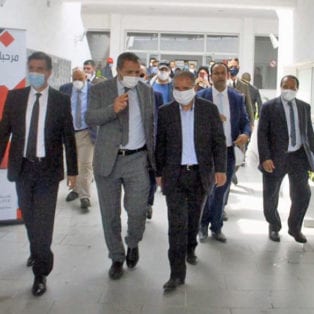
Apr 20, 2020
Some 1.5 million workers across Tunisia’s private sector will not lose their jobs and will be paid during COVID-19-related closures, following a landmark agreement between the Tunisian General Labor Union (UGTT), the Tunisian Confederation of Industry, Trade and Handicrafts (UTICA) and the government. Under the agreement, reached April 14, the government will contribute $70 per worker, with the remaining salary paid by employers. The pact covers workers in agricultural and maritime fishing; construction; metal, garment and shoe manufacturing; transportation; hotels and more.
UGTT Secretary-General Noureddine El-Taboubi commended UTICA, an employer organization, on its commitment to pay their full salaries to private-sector workers after the government’s one-time payment toward each worker’s salary. The agreement, backed by a government decree, results: For instance, 550 workers at the Kaschke Components Tunisie manufacturing firm were returned to the payroll.
“Solidarity must be demonstrated during times of genuine crisis like the current crisis facing Tunisia,” Taboubi says, noting that private-sector workers do not have have access to extensive social protection.
Union Members Across Tunisia Reach Out to Hard Hit Workers
The UGTT, which represents 1 million members across the country, took action early on in the novel coronavirus crisis to assist workers. The confederation pledged to donate $35,000 to a special fund to combat the virus and called on workers to donate a day’s pay. It also joined with the Housing Bank and Ministry of Health to retrofit a social housing building into quarantine facilities for healthcare workers who test positive for COVID-19 to ensure that they receive proper medical care.
Across Tunisia, union members have collected in-kind donations and held fundraisers to help equip hospitals with essential protective gear and medical equipment, and with their unions and the UGTT, donated tens of thousands of dollars to local hospitals, especially to those in regions with few resources such as Jandouba regional hospitals and Sidi Bouzid regional hospital.
UGTT and its unions also are working to ensure workers know their rights during the crisis and are demanding safe and healthy working conditions for those who must remain on the job, pushing for employers to provide masks, gloves and other protective gear.
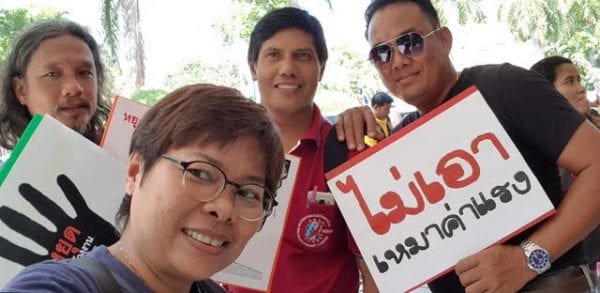
Apr 16, 2020
อ่านบทความเป็นภาษาไทย
In Thailand, where automotive assembly plants have temporarily shut down due to COVID-19, the closures have reverberated throughout the country’s supply chain, with many small- and medium-sized businesses laying off workers or freezing or cutting their pay. So when workers, unsure of their rights, turned for support from union organizer Mongkol Yang-ngam, he responded quickly—and creatively.
Mongkol, a seven-year organizer with the Thai Confederation of Electronic, Electrical Appliances, Auto and Metal Workers (TEAM), a long-time Solidarity Center partner, set up a “Labor Clinic” on Facebook. There, he answers questions submitted to the page and to reach as many workers as possible, posts video clips of himself responding to queries. But like any good union organizer, he also is taking the opportunity to educate and inform workers—through comedic skits that include playing guitar and singing labor songs he composed. His approach is a success: His Facebook Live events between March 31 and today, during which he answered questions and updated government’s policies, have drawn 22,000 views.
Mongkol, 47 (nicknamed Poo, or “crab” in Thai), has been instrumental in helping workers form unions at workplaces such as Volvo Truck, 3K battery (owned by Hitachi), and many automotive parts factories that supply to major brands such as Toyota or Honda. He also serves as a paralegal at the Thai Labor Solidarity Committee (TLSC), a national-level trade union organization with more than 270,000 members. At TLSC, he advises workers on their right and assists them in filing grievances with the Labor Court.
Solidarity Center Senior Program Officer Piya Kritayakirana recently interviewed Mongkol about his successful outreach to workers during the novel coronavirus crisis. The interview, conducted in Thai and translated, has been edited for clarity and length.
Piya Kritayakirana: Can you please give a bit of your background and how you became a trade union organizer for TEAM?
Mongkol Yang-ngam: I grew up in Samut Sakhon (an hour outside Bangkok) where my family had a small business, and I got a job at Thai Sin rubber factory near my home. The factory was already unionized. When I was eligible to apply for union membership, there was a vacant position on the union board, so I applied and got the position.
I worked eight years in the factory, and also did an extra work to earn more income. My extra work required me to carry heavy rubber parts hundreds of times a day. I quit the factory as my body started to give out, and worked at restaurants, where I witnessed how badly workers were treated by customers, making me want to do something to help exploited workers.
PK: From my understanding, your responsibilities include organizing new unions and providing legal advocacy and assistance. Can you describe both?
MY: Trade union organizing and legal advocacy have to happen concurrently. In Thailand, employers view unions as rivals. We have to make workers confident that the union could stand against the attack and can co-exist with the employer. We have to prepare them through rights and legal education. My work providing legal assistance and advocacy is crucial, as many workers in Thailand cannot afford lawyers. The TLSC Legal Department provides free legal service and representation to fill this gap.
PK: How does the COVID-19 pandemic affect your work, both in terms of trade union organizing and legal advocacy?
MY: The pandemic heavily affects our organizing work, as we cannot meet face-to-face with workers. We try to maintain conversation though social media platforms such as Facebook or Line (a messaging app), and sometimes call to check up on the workers we are trying to organize.
The impact on legal advocacy is also huge. There are already many violations, such as layoffs or dismissals without severance pay. Court appointments are being postponed due to the pandemic, and workers seeking relief are running out of money and are forced to agree to the employers’ poor offers. Most employers are using the pandemic as an excuse to deny unions’ bargaining proposals, even when the records clearly show their operations have not been hurt by the crisis.
PK: When and why did you start the Labor Clinic Facebook Page?
MY: I have to give most credit Brother Chansin Sapnonwai (former union leader at Honda Automobile who briefly worked as a trade union organizer with the global union IndustriALL). In mid-2019, we both recognized workers did not like to study about labor law, but liked to watch things that were entertaining. We then came up with the idea to make the labor law education entertaining. We tried to make video clips that were not too long, to attract more workers’ attention.
PK: What are the formats you use in Labor Clinic Facebook Page
MY: We try to use all available formats. I just did Facebook Live for an hour to update the situation from each company. I also use this to show how unions can be the solution for workers. I said in the Facebook Live that unionized companies such as Auto Alliance or Ford are paying workers higher than the legal requirement during the temporary suspension, while many nonunion companies ask workers to agree to wages lower than the law requires.
PK: What are the violations you find during the COVID-19 pandemic?
MY: Most violations deal with the employers’ non-compliance with the law on temporary suspension of business. Section 75 of the Labor Protection Act requires employers who temporarily suspend business to pay 75 percent of wages to their workers. Many employers invoked these clauses, but then told the workers to apply for social security unemployment benefits rather than covering their workers’ reduced wages. This already happens to many hotel workers.
Some companies ask workers to resign without compensation, and promise workers they would be rehired once the situation got better. I encouraged workers to be realistic. First, who knows when anything would get better? Second, how can you put all your trust in the company? Or do you put a company’s hat on and think that it would actually be to their benefit to recruit a new and younger workforce with lower wages and fewer benefits? I encourage workers to get what they could for now.
PK: How do the workers who view your Facebook page use the knowledge and information you give them?
MY: After watching, they are more aware of their rights. They are also more curious and keep coming back with more questions. Once the workers learn of their rights and realize the employers have fooled them on many occasions, they become very concerned and very aware.
PK: What more do you think Thai labor movement should do to help workers during the COVID-19 crisis?
MY: First, union leaders have to keep themselves updated of the situations and policies. The government has no consistency and the employers look for any opportunity to put all burdens on workers. The work of the union leaders and activists has to be more proactive. We can no longer wait for workers to come to us with questions but we have reach out to them and try to dig in on the violations that happen to them.
My organization, TEAM, is currently compiling all the new government policies to inform and communicate broadly with workers. TLSC leadership is also talking about setting up a grievance filing center.
We also have to discover the mutual interests and concerns of all workers, educate them about the benefits of union membership and show how unions can be the solution.
PK: Lastly, what message of solidarity would you like to convey for workers around the world who are struggling through similar circumstances?
MY: This is a global crisis, and when it happens, it always impact workers the most. I want to see the global labor movement to come out and show support for each other. We have to build awareness for workers all over the world that we are the essential people who keep the world moving during the time of crisis. When we are aware, and we believe in ourselves, it will be the time we truly change the world for the better of workers.
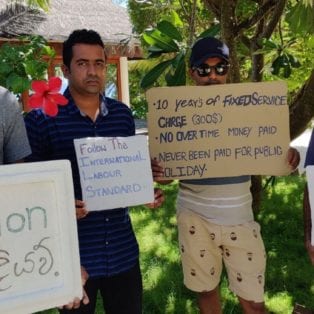
Apr 16, 2020
The Maldives Trade Union Congress (MTUC) and its affiliates say the government must rapidly address the economic and health impacts of the COVID-19 crisis, urging passage of occupational safety and health and labor legislation and an economic stimulus package targeted to protect jobs and income security of the island nation’s most vulnerable workers.
“All actions and policies must prioritize and protect worker rights and ensure decent work for all, with the inclusion of the migrant worker population in the country. Further, policies must be developed in consultation with trade union and employer organizations,” MTUC says in a statement.
With its population spread across 188 islands, Maldives is highly dependent upon travel and tourism, which has been hard hit in the coronavirus crisis, and workers are suffering the brunt of the impact. More than 11,000 resort workers, including migrant workers, are on unpaid leave or have received pay cuts while undocumented migrant workers were forced to leave the resort islands and are trapped in the capital, Malé, unable to return home.
Union Leader Targeted with COVID-19 as Cover
Union activists say the government issued contradictory regulations in a scramble to keep the resorts operating. With rapidly changing regulations, Ibrahim Ziyad, branch leader of the Tourism Employees Association of Maldives (TEAM), was arrested and detained last month after returning to work for violating coronavirus travel restrictions. He was fired a day after being arrested, a move seen by TEAM as an act of retaliation for his union activities, which have paved the way for safe working conditions for employees.
Ziyad, who has since been released, still faces a six month jail sentence because charges have not been dropped.
A staff member at JA Manafaru, a five-star luxury resort in the North of Maldives, Ziyad was asked to go on annual leave by management following an announcement by the Maldives Health Protection Agency (MHPA) of a new 14-day travel restriction to combat the spread of COVID-19. Ziyad departed to his island of residence, HA Kelaa on March 14 (a day before implementation of the restriction), planning to return to work later on. While the MHPA announcement mentioned restrictions on travel between inhabited islands, it allowed for resort employees to travel between their homes and their workplaces.
Upon completion of his annual leave, Ziyad returned to the resort and was admitted by hotel security. Unaware of a further notice by the MHPA that restricted all forms of travel, which was circulated internally to hotel staff on March 18, Ziyad was visited in his quarters by the human resources manager and resort doctor who said that he was in violation of MHPA orders and would have to remain in isolation pending the resort doctor’s clearance.
The following evening Ziyad was arrested by police and sentenced to a 15-day prison term pending investigations. He was terminated from employment a day later.
On March 25, the MHPA issued a new notice allowing resort employees to travel between resorts for employment and on holidays.



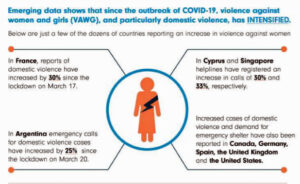

 During the COVID-19 crisis, unions around the world are addressing the effects of domestic violence on workers.
During the COVID-19 crisis, unions around the world are addressing the effects of domestic violence on workers.
